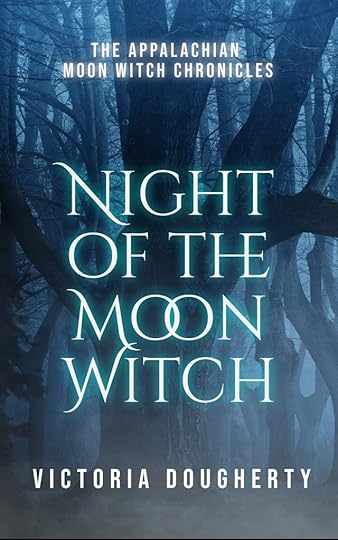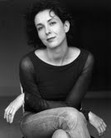Packing Away Twenty Years – And One Curse
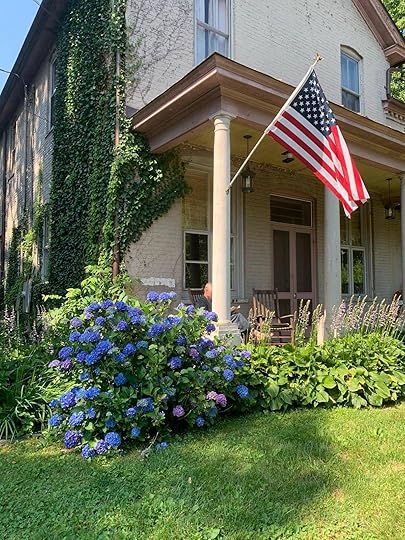
When I flew from Doha to Virginia for three months, I carried only one suitcase—the rest of my belongings still anchored in our house here, though not for long. I’ve spent the past weeks packing up twenty years of living, readying the rooms for another family to move in. Soon, they’ll eat at our table, sleep in our beds, make their own small history under our roof. I want them to love the place, but not so much they forget it’s only on loan.
As I’ve been sorting through objects and memories—an old, churchy candelabra I bought my husband for Christmas one year, a clay ballerina my daughter sculpted in art class, my son’s Boy Scout sash—I’ve also been unpacking a year of creative expatriation. I’ve been weighing what the desert silence taught me about south-central Virginia ghosts—the ones that keep to the edge of the vast Appalachian wilderness.
These contrasts aren’t simply curiosities to store for my writing—though they feed it well. They have always been, for me, a source of clarity.
In Virginia, light falls gentle and dappled through oak and poplar. Silence is never whole, it’s stitched with the murmur of creek water, cicada thrum, bird calls, the wind teasing through leaves like whispered scripture. The calls to prayer here are inward—the deep inhale before a promise, the gut-punch of a memory, the wordless petitions I send for my children’s safety while I’m far away.
In Doha, light is sharp as a blade at noon, softened at day’s edge by desert dust that turns the horizon to rose and copper. Silence is vast—a breath held under heat so thick you can feel yourself moving through it. The calls to prayer are a public affair, rising five times daily, a braided spiritual music that reminds you worship is not just private devotion, but a cultural heartbeat that cannot, will not be ignored.
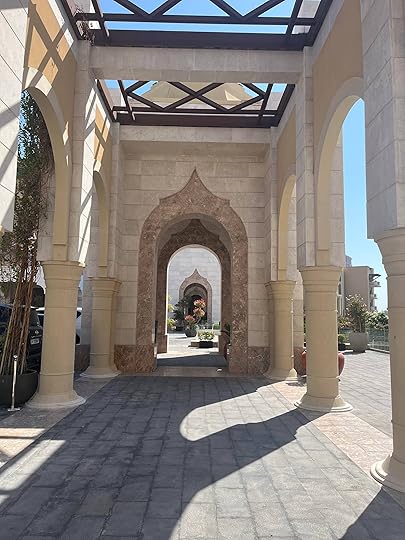
Doha is not my first displacement. I come from an immigrant family driven from home by war and politics. While I grew up in Chicago, I’ve also lived in Prague, St. Louis, San Francisco, and now Qatar–moves I undertook by choice.
I know very well the strange gift of detachment that displacement brings—and I welcomed it after years of struggling through my mother’s trauma and the wreckage it has wrought in her old age. I had always imagined caring for her during her twilight years, pictured her releasing the shadows of her childhood—the abandonment, the persecution, the years as a political prisoner and refugee—and letting herself rest in the love of her grandchildren.
But my own naïveté did not imagine how dear those shadows had become to her. That she would tend to them like a private garden, coaxing them to life in conversations with cashiers, doctors, friends, and finally, those who loved her most.
I had believed, with the stubborn faith of someone who has never lived through war, that love could be more compelling than trauma. That the present could be more real than the past, and a daughter’s devotion might, eventually, matter more than a lifetime of practiced abandonment.
It’s not that I don’t understand the pull of the past. My family’s refugee story became the bedrock of my identity—the foundation myth that taught me to leave without fear, to adapt, to make homes in foreign places. That inheritance was a gift, a resilience passed down like a family recipe. It allowed me to carry home inside myself and write from anywhere—whether Cold War thrillers or time-bending fantasies about love surviving the ashes of an apocalypse.
But standing in our Virginia kitchen now, packing up the iron skillets we’ve cooked in for over two decades, I can feel how different this homecoming is from the way I imagined it. The dappled light that once seemed gentle now reveals too much—the way hope can become its own kind of delusion, the way some prayers are answered with a silence so complete it changes the shape of your mouth.
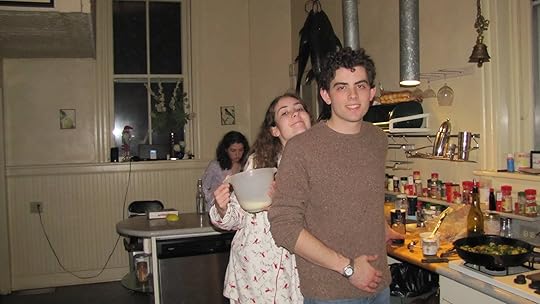 I miss these dinners most.
I miss these dinners most.It was my mother who taught me to pack light, to carry my treasures in my heart rather than in suitcases. She taught me that adaptation was an art form. But she also taught me something else, something I’m only now learning to name: that some people make exile their permanent address. Not geographical exile, but the kind that happens when you make a homeland out of hurt.
Writing Night of the Moon Witch was like performing an autopsy on my mother’s wounds–how she polished them into cherished heirlooms, handed down with more care than her wedding ring and family portraits. As I conjured up the story of the Bramwell women, moon witches bound by blood and silence, I began to see how my mother is bound by an even stronger curse: the terrible intimacy she shares with her own pain, the way it has become her truest, most reliable companion.
But curses, I’ve learned, only have the power we give them.
As I pack away our family pictures and the sweet, goofy mementos we’ve collected over years, I’m conducting the strangest archaeology—excavating twenty years of hoping someone might choose healing over history, sorting through all the tenderness I prepared for a mother who ultimately rejected it.
I’m realizing how the answers I seek lie somewhere in the space between the Virginia silence and the Doha silence—in that place where distance becomes not escape, but perspective. Where displacement teaches the difference between carrying your stories with you and being weighted down by them.
My mother’s inheritance to me is complex: she taught me to survive anywhere, but she also showed me exactly what survival can cost when it becomes your only story. Some inheritances can be accepted with gratitude. Others can be acknowledged with compassion—and then, carefully, deliberately, set down.
I’m still learning to let go of hope for revelation, for peace, for the mother I’ve seen glimpses of over the years, and the one I imagined she might become. But I’m also learning something else: how to pack differently. How to carry her resilience without carrying her ghosts. How to honor the survivor in both of us while writing my own ending to the story.
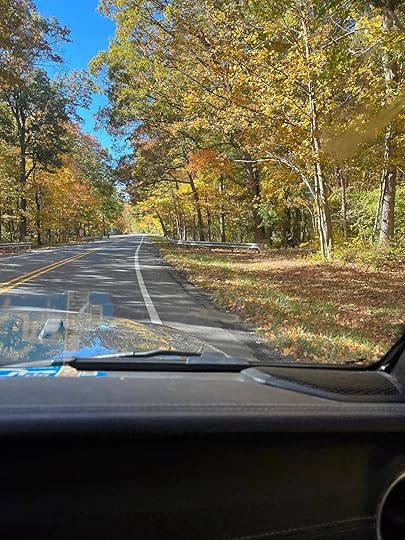
Preorder your Night of the Moon Witch ebook on Amazon today, or your real, hold-in-the-hand copy on Speakeasy Editions.
When poetry professor Twila Stith arrives in the mysterious mountain town of Sibyl Springs, Virginia, she thinks she’s starting over. She couldn’t be more wrong
Fired from her university position and desperate for a fresh start, Twila accepts a teaching job at the prestigious Valemont School for the Gifted. But from the moment she sets foot in this old Appalachian town, she knows something is watching her. A man plunges to his death from the historic Montague Hotel, his blood staining the grand entrance. Strange dreams blur the line between memory and vision. A ghostly girl from decades past appears with cryptic warnings. And most unsettling of all, she finds herself inexplicably drawn to Langston Martin—her enigmatic department head who seems to despise her on sight, and harbors secrets as old as the mountains themselves.
As eerie encounters escalate and the full moon approaches, Twila discovers that her lifelong fascination with lunar cycles runs deeper than mere poetry. The residents of Sibyl Springs recognize something in her that she doesn’t understand—something that makes her both powerful and dangerous. When ancient forces begin stirring in the shadowed hollows and a malevolent entity sets its sights on her, Twila must uncover the truth about her connection to this place and its supernatural inhabitants.
But in a town where everyone guards their secrets and the past refuses to stay buried, Twila will learn that some truths are more terrifying than any lie—and remembering who she really is might be the most dangerous thing of all.
